PERSONALIZED MEDICINE | TAILORED MEDICINE | GENOMIC MEDICINE
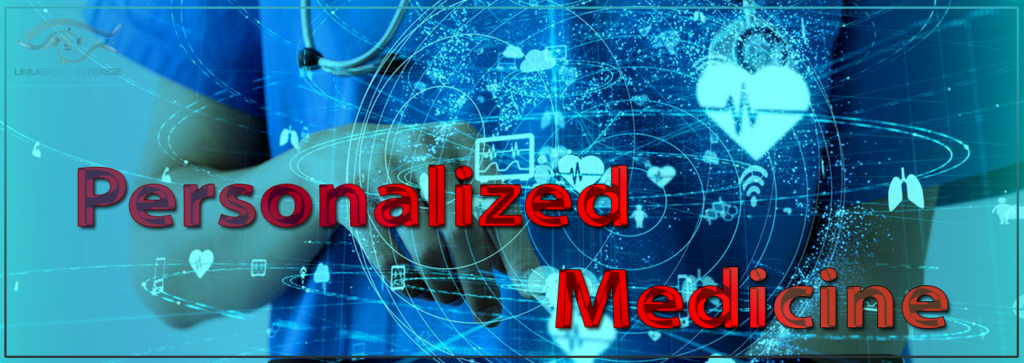
What is personalized medicine?
Personalized medicine is one of the emerging practices of medicine today. An individual’s genetic profile based on a genetic test or biomarker, is used there to guide decisions made regarding the prevention, diagnosis, and treatment of a particular disease.
Due to the huge advances in the understanding of how both our bodies and diseases work, a much more precisepicture of the most effective medicines for a particular individual can be developed now. This term is known as personalized medicine and it provides a kind of tailored treatment, which targets particular attributes that are unique to an individual. Mainly, patients are defined by common traits, their age, gender, ethnicity, medical history and lifestyle choices. Far more accurate patient profiles can be created by narrowing these groups down. But a close lookup is needed to understand every individual correctly. Each individual has a distinctive genome which is the complete set of genetic instructions for making him. A detailed map of an individual’s genomecan be created using DNA sequencing. Then alterations or patterns of genes should be identified that might be potential risks or the driver for a particular disease. Fast, large-scale, low-cost DNA sequencing is driving the rapidly growing field of genomics, the study of genes. And this is at the center of delivering the next generation of personalized medicine.
Precursors of personalized medicine
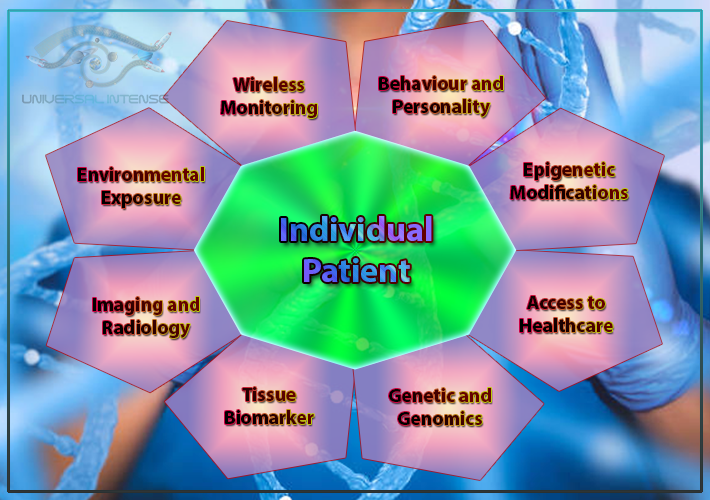
Elements in need of integration and assessment in pursuing truly personalized medicine. Access to health care is an important factor in personalized medicine since some individuals may not be able to access expertise and technologies due to several issues including geographic or economic barriers. Therefore, interventions might need to be crafted for those individuals with this in mind. Inherited genetic information is really only predictive or diagnostic in nature. However, somatic changes to DNA can provide valuable insight into pathogenic processes. Tissue biomarkers including routine blood-based clinical chemistry panels are useful for detecting changes in health status, as are imaging and radiology exams and data collected routinely via wireless monitors. The success of an intervention is impacted by environmental exposures and behaviors. It exhibits great intra-individual variability. Gene function is reshaped by epigenetic phenomena based on exposures and developmental or stochastic phenomena. This should be monitored since they are the indicators of a health status change.
Genomics and personalized medicine
Researchers use genomics to discover the factors behind why some people get sick and some don’t. Since human beings are 99.9% identical in their genetic makeup, differences in that remaining 0.1% hold important clues on both the causes of diseases and why people’s response to different medications is different.
Pharmacogenomics
Pharmacogenomics can be considered as an important example of the field of precision medicine. It aims to tailor medical treatment to each person or to a group of people. In Pharmacogenomics, effects of DNA towards the response of people to drugs is considered. DNA can affect whether the person has a bad reaction to a drug or whether a drug helps him or has no effect. Pharmacogenomicscan improve people’s health by letting them know ahead of time whether a drug is likely to benefit them and be safe for them to take. Doctors can use this information to find the best medicine that will work for their patient.
Personalized medicine in oncology
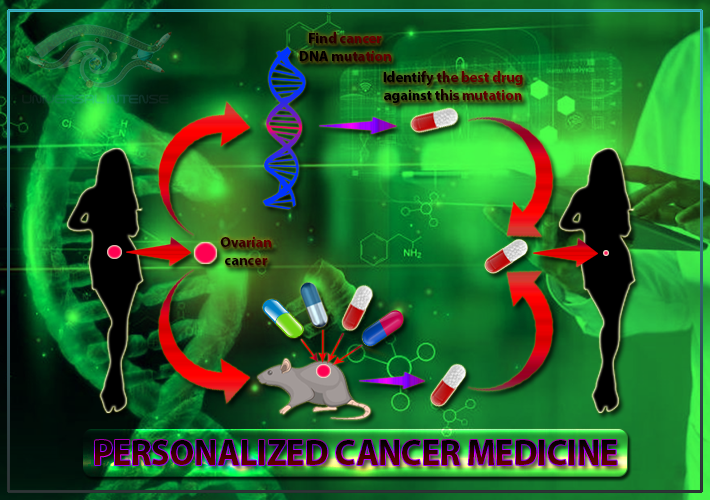
When considering cancers, for some particular cancers, there are specific genomic alterations that have been driven to a tumor’s growth. Doctors can identify the right treatment for an individual patient using these specific alterations. Many diseases, including some type of cancers, are caused by alterations in the genomic make up of a cell – making the cell cancerous. Genomics can identify these alterations and search for them using an ever-growing number of genomic tests.
In the present, oncology is used at the forefront with genomics to develop more effective cancer treatments. On the one hand, genetic tests (which test for the inherited genes an individual has) indicate susceptibility to certain diseases while allowing for pre-emptive treatment to begin. On the other hand, it helps doctors to take a biopsy of the tumor of a cancerous patient, and do comprehensive genomic testing. As an example, DNA or RNA sequencing works with big data analytics can be done to identify abnormalities, called biomarkers, in the tumor, and then allows for the use of more targeted treatments.
Currently, the Cancer Genome Atlas in the United States has mapped key genomic changes in more than 30 types of cancers including oncogenic cancer drivers. So, while there is still a long way to go, the potential to deliver more detailed diagnoses and develop better treatments would be greater if we can identify more biomarkers.
Statistics on Adverse Drug Events
According to CDC,
- 82% of American adults take at least one medication and 29% take five or more.
- Adverse Drug Events (ADE) cause over 700,000 emergency department visits each year.
- Nearly 120,000 patients need to be hospitalized each year for further treatment.
- $3.5 billion is spent on extra medical costs due to ADEs annually.
According to FDA,
- Over 100,000 people die each year due to adverse drug events.
- 4th leading cause of death, ahead of pulmonary disease, diabetes, AIDS, pneumonia, accidents and automobile deaths.
- ADEs cause injuries or death in 1 of 5 hospital patients.
Traditional medicine VS personalized medicine

Currently, most physicians rely on the “one size fits all” approach. Using Alpha Genomix, the right drug at the right dose for the right PATIENT can be selected.
“One size fits all” approach
In the medical world, “One size fits all’ has been the standard for a long time. Everyone is given the same lifestyle rules to prevent illness including a healthy diet, no smoking, enough exercise, moderate alcohol consumption. When a patient is diagnosed with a disease, he is treated according to a protocol that is the same for everyone.
Due to comprehensive pharmaceutical tests on thousands of patients, a doctor has an idea on the percentage of cases where the medication is effective, and what side effects will occur with which probability. They can see what happens by administering the medication and then adjust the treatment through changing the dose or the medication and prescribing additional medication for the side effects.
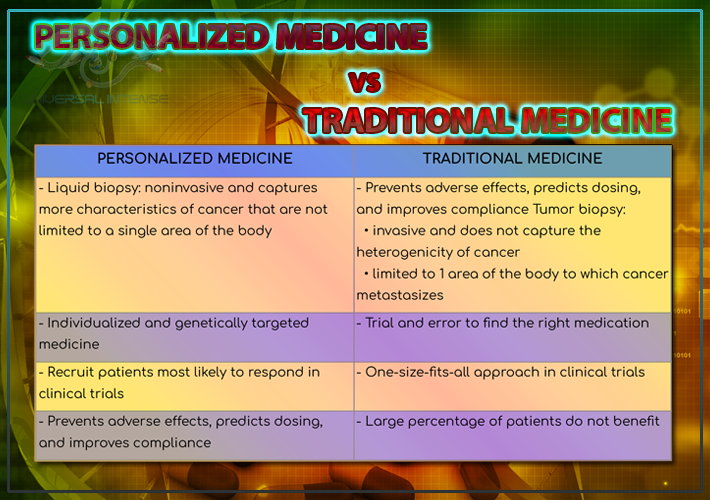
Personalized medicine | Traditional medicine |
Individualized and genetically targeted medicine. | Trial and error to find the right medication. |
Adverse effects prevention, dose prediction, compliance improvement. | Large percentage of patients do not benefit. |
Recruitpatients most likely to respond in clinical trials. | One-size fits all approach in clinical trials. |
Liquid biopsy:
| Tumor biopsy:
|
Personalized treatment cycle
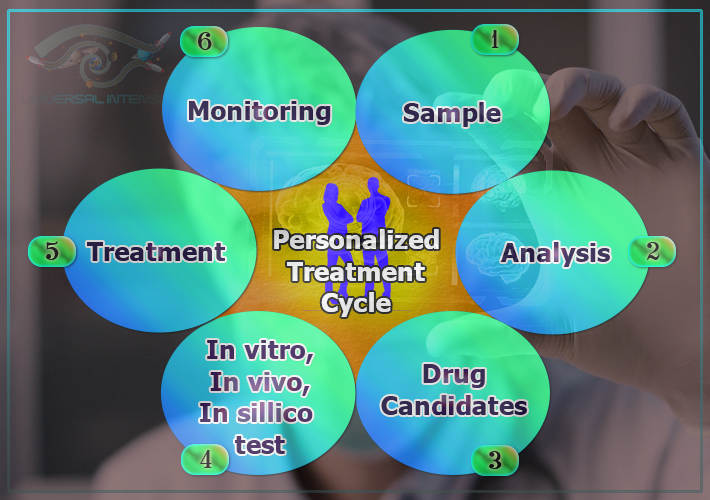
- Specimen
- Specimen and genome analysis
- Data based medication selection
- Optimal medication selection
- Treatments on patients
- Monitoring on effect
Personalized medicine in psychiatry
Personalized medicine can be used in psychiatry in-order to decide which individual should receive what specific type of treatment. This is done using personalized measures, and also eventually identifies patients at risk. This reduces long-term costs of mental health. So, the goal of using personalized medicine in psychiatry is a laudable one, because it involves a marked reduction in morbidity and mortality. Personalized medicine can be used in psychiatric diseases including major depressive disorder, bipolar disorder, and schizophrenia. Additionally, personalized medicine can be used in psychiatry, on novel biomarkers and neuroimaging as an emerging application. Personal medicine is used to decrease symptoms, avoid undesirable outcomes including hospitalization, and improve mood, thoughts, behaviors, and the overall sense of well-being in the psychiatric setting.
Pharmacogenomics developments are also aid for personalized medicine in psychiatry including adjusted therapeutic doses, predictable responses, reduced adverse drug reactions, early diagnosis, and personal health planning. Though these prospects are exciting, still these new techniques engage with important scientific, ethical, legal, and social challenges. So, there should be an ethical balance between challenge and opportunity of personalized medicine in psychiatry under different aspects including adequacy, cost benefit ratio, and therapeutic equity.
Personalized medicine care diagnostics
Point of care (POC) diagnostics are becoming an important way to deliver personalized medicine to patients who have chronic diseases and genetic variations which cause outcomes. The driving force behind this method is to provide expedited diagnosis where the patient is seen or in the patient’s home. New technologies have been improved to allow POC devices to produce quantitative lab-quality test results which can be transferred automatically to an information system, a remote caregiver service for consultation, or an electronic medical record.
Further, technological advances have turned smartphones and microchips into mobile laboratories which expand the trend in remote areas. And also the growing popularity of home monitoring equipment, wearables, and telehealth is helping to connect vulnerable patients with more comprehensive care. At the same time, machine learning enables faster diagnostics which can return results in minutes or hours instead of days. Combined with the precipitous drop in time and cost for genetic testing, diagnostics developers are grasping upon the potential to bring an incredibly strong range of tests and analytics tools right to the bedside.
Since precision medicine finds its way into more and more hospitals and physician offices, quick access to genetic test results could speed the identification and treatment of cancers, cardiac conditions, and gene mutations which impact a patient’s responses to certain medications. Point-of-care testing can be of great benefit inorder to identify a particular issue in specialty situations as well as in the primary care environment, but health IT developers still have not figured out the best way to present critical information to clinicians within the electronic health record.
Advantages of personalized medicine
Personalized medicine is advantageous for both clinicians, patients and pharmaceutical industry as well.
- Early detection of disease
- Preventive strategies
- Faster and precise diagnosis
- Offers personalized treatment
- Better matching patients to drugs instead of “Trial and error”
- Customized pharmaceuticals may eliminate life threatening adverse reactions
- Emergence of new gene targets for drug discovery
- Reduce costs of clinical trials by
- Quick identification of total failures
- Favourable responses for particular backgrounds
- Improved efficacy of drugs
- Better health and better health care
- Product differentiation in the marketplace
Disadvantages of personalized medicine
- Greater costs of diagnostics/biomarkers
- Smaller patient markets for therapeutics
- Need to track individual health information
- Necessity for accelerated Health Information Technology (HIT)
- Diagnoses without treatments
- Re-education of healthcare professionals
- Distraction from other money saving opportunities
- Incorrect diagnostic result
- Genetic variations are numerous and quantitative
- Not widely available
- People do not opt for personalized medicine
Limitations of personalized medicine
- Reimbursement pathway of testing not established
- Ethical issues with genetic testing and data sharing
- Integration of Pharmacogenomics, personalized medicine and the prayer and regulatory environment is still ongoing
- Clinician are generally not educated concerning available tests, associate drugs and outcomes
- The response to a medication may be a result of the interactions of multiple genes

Dear Website Owner,
I recently discovered your website and was impressed by the quality of your content and the helpful information you offer to your audience.
Best regards,
David E. Smith
Email: david@cheapestdigitalbooks.com
Address: 3367 Hood Avenue, San Diego, CA 92117